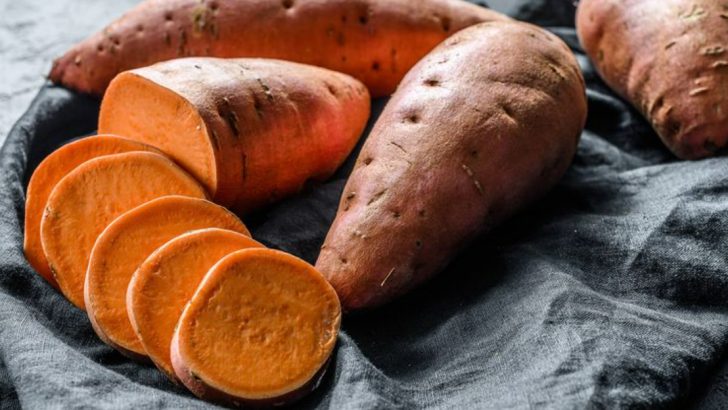Your backyard is hiding a vitamin A jackpot! Swap those bland white spuds for sweet potatoes bursting with color—and 1,000 times more vitamin A. One scoop of orange flesh and you’ve just supercharged your vision, your immunity, and your skin’s glow. Growing them? It’s like taming sunshine. Plant slips into warm soil, and they trail vines across your sweet patch—no fuss, just fun. They shrug off summer heat and laugh at poor soil, sending tubers racing underground. Harvest time becomes a treasure hunt. Dig a little, find a cluster of creamy, buttery roots begging to be roasted, mashed, or spun into fries. Kids love unearthing them. Neighbors swoon over your farm-fresh haul. Ready to swap your garden for a sweet potato empire? These 13 reasons will have you plotting rows of orange gems before frost even threatens. Get set to dig in and dig up some serious health perks!
Rich in Nutrients

Sweet potatoes are nutrient-rich. Packed with vitamins, they provide 1000 times more Vitamin A than white potatoes. This essential vitamin supports vision, immune function, and skin health.
In addition to Vitamin A, sweet potatoes are a good source of vitamin C, manganese, and fiber, contributing to overall health. The vibrant orange flesh indicates high beta-carotene content, which is converted into Vitamin A in the body.
Including sweet potatoes in your diet can help meet your nutritional needs while offering a delicious addition to your meals.
Easy to Grow

Sweet potatoes are easy to grow, even for novice gardeners. They thrive in various climates and soils, requiring minimal maintenance.
Their resilience makes them perfect for home gardens, where they can flourish with simple care. Sweet potatoes grow from slips – shoots from mature tubers – making planting straightforward.
These low-maintenance plants are excellent for those looking to explore gardening without much hassle. With the right conditions, anyone can enjoy a bountiful sweet potato harvest.
Versatile in Cooking

Sweet potatoes are incredibly versatile in the kitchen. They can be baked, boiled, mashed, or fried, fitting seamlessly into a variety of dishes.
From savory to sweet, including pies and fries, their unique taste and texture complement many flavors. Sweet potatoes can be used as a healthier alternative to regular potatoes in most recipes.
Their natural sweetness enhances both main courses and desserts, making them a favorite ingredient among chefs and home cooks alike.
Supports Sustainable Farming

Growing sweet potatoes supports sustainable farming practices. They are efficient in nutrient uptake, minimizing the need for fertilizers.
Their growth helps improve soil health, preventing erosion and enriching the earth for future crops. Sweet potatoes can be intercropped with other plants, promoting biodiversity.
By opting for sweet potatoes, farmers contribute to a more sustainable and environmentally friendly agriculture system. This makes them an ideal choice for eco-conscious growers.
High Yield Crop

Sweet potatoes are known for their high yield. A single plant can produce numerous tubers, making them a rewarding crop for gardeners and farmers alike.
Their ability to produce a substantial harvest in a relatively small space makes them valuable for those with limited land. Sweet potatoes thrive in warm climates and grow well in various soil types.
This high productivity ensures a steady supply of nutritious provisions, enhancing food security and offering economic benefits to growers.
Long Storage Life
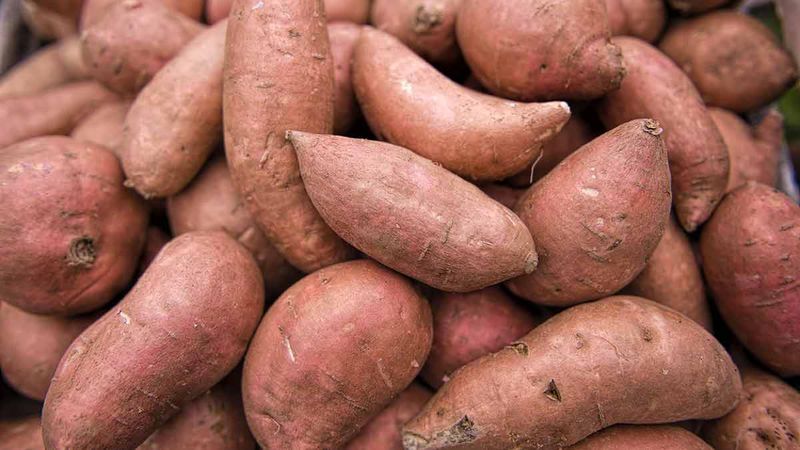
Sweet potatoes have a long storage life, making them practical for long-term use. When stored correctly in cool, dark places, they can last for months.
This attribute reduces food waste and ensures a consistent food supply. Their natural durability makes them an excellent staple for households looking to maintain a balanced diet throughout the year.
The extended shelf life of sweet potatoes is advantageous for both home use and commercial purposes, offering convenience and value.
Improves Soil Quality

Sweet potatoes play a role in improving soil quality. Their extensive root system helps break up compacted soil, enhancing aeration and drainage.
As they grow, sweet potatoes contribute organic matter, enriching the soil with nutrients. This natural process supports healthier soil ecosystems, benefiting future plantings.
By cultivating sweet potatoes, gardeners and farmers can enhance the health and fertility of their soil, ensuring better productivity and sustainability in agriculture.
Aids in Weight Management
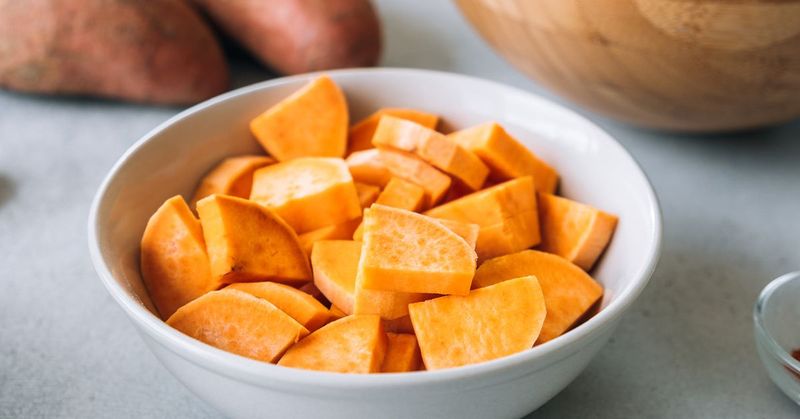
Sweet potatoes aid in weight management due to their high fiber content. The fiber helps keep you feeling full longer, reducing overall calorie intake.
Their low glycemic index means they release sugar slowly into the bloodstream, preventing spikes in blood sugar levels. This makes them a suitable option for those monitoring their weight and blood sugar.
Including sweet potatoes in meals can support healthy eating habits, contributing to a balanced diet and weight control.
Boosts Immune System
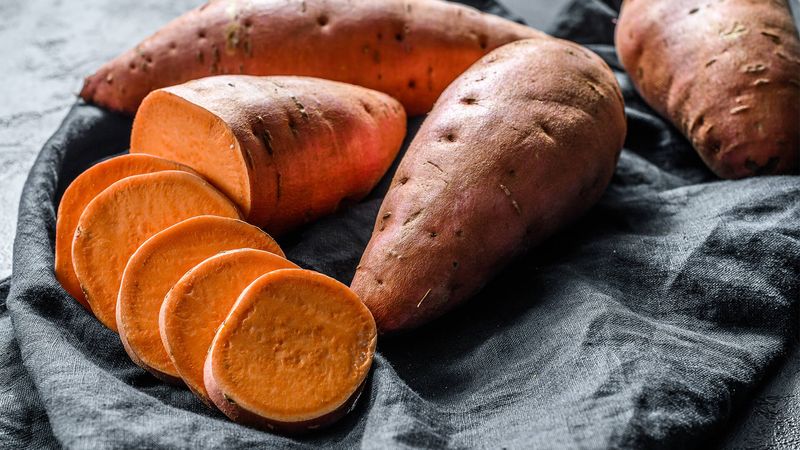
Rich in antioxidants, sweet potatoes boost the immune system. The high levels of Vitamin A and C help strengthen immunity and promote overall health.
These vitamins play a crucial role in combating infections and reducing inflammation in the body. Sweet potatoes also contain other beneficial compounds that support immune function.
Including them in your diet can enhance your body’s defense mechanisms, keeping you healthier throughout the year.
Supports Eye Health
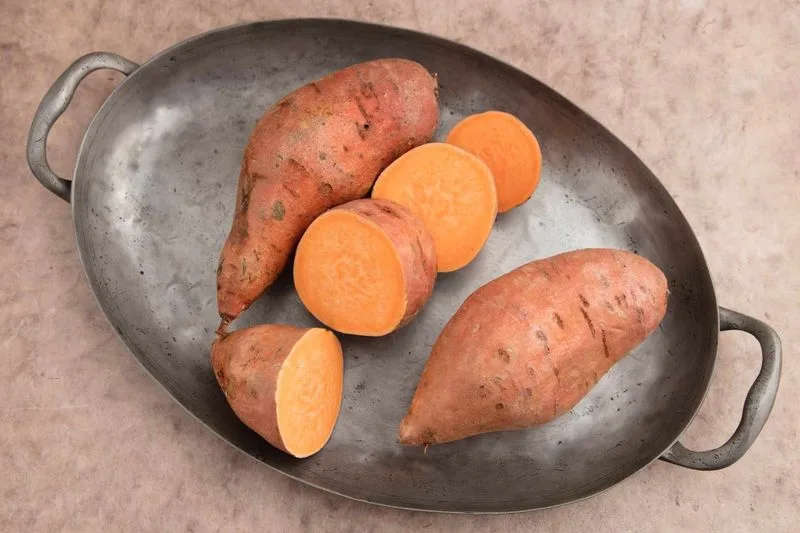
Sweet potatoes are excellent for eye health. Their high beta-carotene content is converted into Vitamin A, integral for maintaining good vision.
Vitamin A deficiency can lead to serious eye conditions, and including sweet potatoes in the diet helps prevent these issues.
Regular consumption contributes to the health of your eyes, supporting good vision and overall eye function. They are a delicious and nutritious way to protect one of your most vital senses.
Natural Sweetener

Sweet potatoes can serve as a natural sweetener. Their natural sugars provide sweetness without the need for refined sugars in recipes.
This makes them perfect for baking and cooking, offering a healthier alternative to processed sweeteners. The subtle, earthy sweetness of sweet potatoes complements a wide range of dishes.
Using sweet potatoes as a sweetener can enhance flavors while maintaining a nutritious profile, appealing to health-conscious cooks.
Cultural Significance

Sweet potatoes hold cultural significance in various regions worldwide. They are a staple in numerous traditional dishes, reflecting the culinary heritage of different cultures.
From African stews to Asian desserts, sweet potatoes feature prominently in diverse cuisines, highlighting their global appeal. Their history and cultural relevance enhance their value beyond mere nutrition.
Exploring sweet potatoes’ role in cultural dishes offers a unique culinary experience, connecting people through shared food traditions.
Child-friendly Taste

Sweet potatoes have a child-friendly taste, making them a hit with younger palates. Their natural sweetness and soft texture are appealing to kids.
They can be prepared in various child-friendly ways, from fries to mashed servings, ensuring they fit into family meals. Their nutritional benefits make them an excellent choice for growing children.
Parents can feel confident serving sweet potatoes, knowing they offer both taste and health benefits, encouraging healthy eating habits from a young age.

